
Congressional candidate Nez attends Arizona Democratic Party hosted town hall
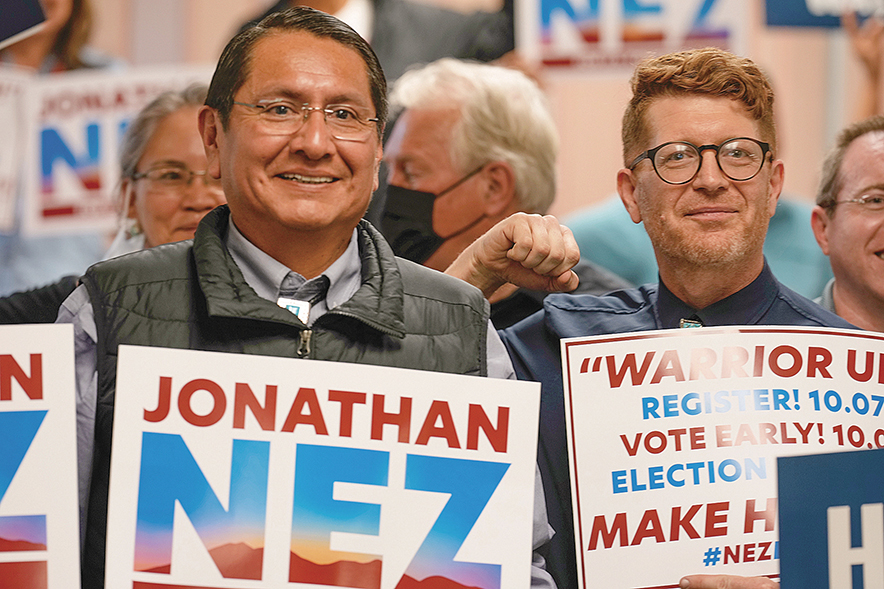
Special to the Times | Donovan Quintero
Former Navajo Nation President Jonathan Nez is seeking to become the first Native American to represent Arizona in the U.S. House. Nez and Joshua Polacheck, right, one of three Democratic candidates for the Arizona Corporation Commission, stand for a photo inside Quality Inn in Window Rock on Oct. 7.
By Donovan Quintero
Special to the Times
WINDOW ROCK – In his campaign to represent Arizona’s 2nd Congressional District, former Navajo Nation President Jonathan Nez is emphasizing water security as a critical issue impacting rural communities.
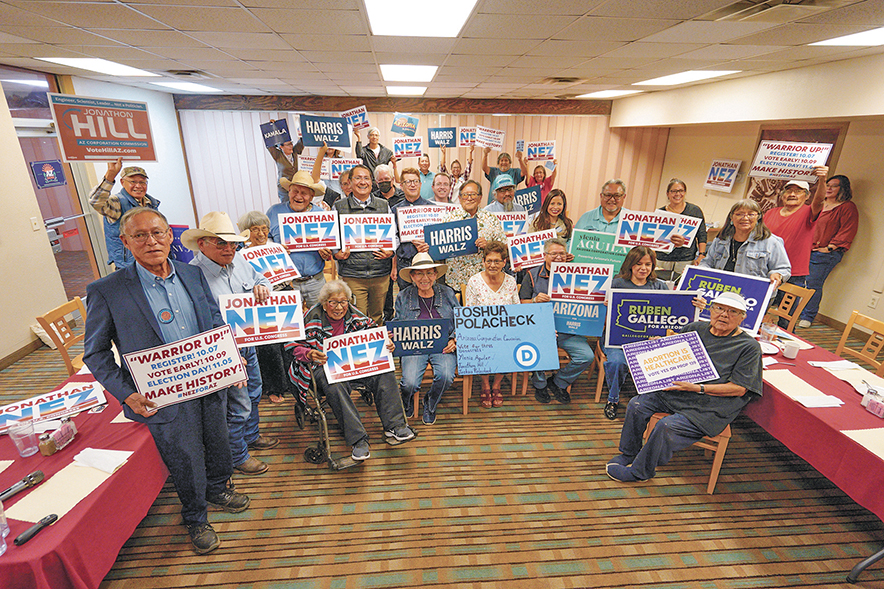
Special to the Times | Donovan Quintero
Apache County Voter Town Hall attendees, including Democratic candidates Jonathan Nez (running for U.S. Congressional District 2), and Arizona Corporation Commission candidates Ylenia Aguilar, Jonathon Hill, and Joshua Polacheck, pose for a photo inside Quality Inn in Window Rock on Oct. 7.
Nez, who is challenging incumbent and first-term Republican Eli Crane, highlights that while immigration remains a pressing national concern, residents in his district are more urgently seeking solutions for local infrastructure, particularly regarding water, electricity, and broadband access.
Efforts undermined
Nez acknowledged the importance of addressing immigration, noting that previous bipartisan efforts had been undermined, particularly by former President Donald Trump. However, he stresses that the primary concerns for voters in rural areas include enhancing water infrastructure, improving roads, and reducing the cost of goods and services.
“Congress has the ability to hold corporations accountable,” Nez said, referring to the record profits reported by some businesses.
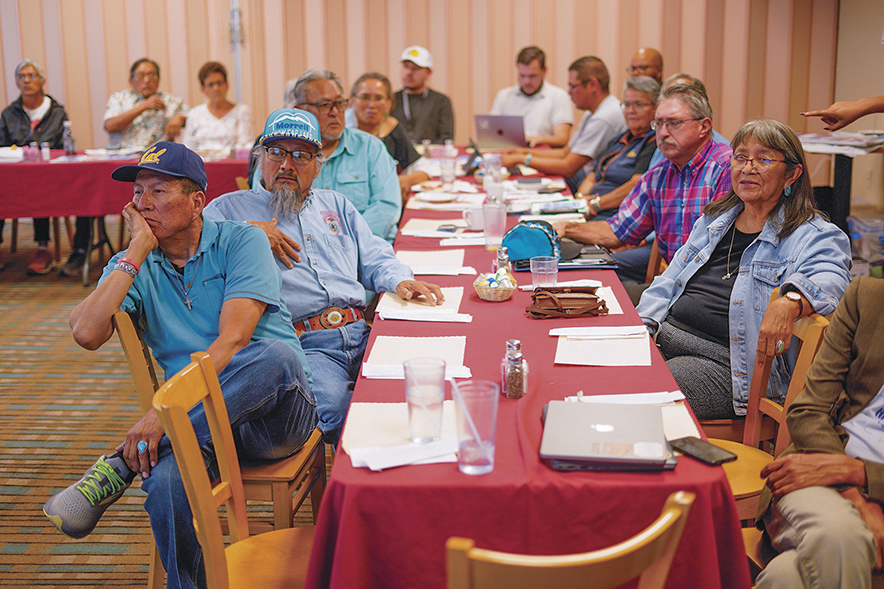
Special to the Times | Donovan Quintero
Apache County Voter Town Hall attendees listen to Democratic candidates running for office on Oct. 7.
He criticized the potential for renewed tax breaks under Trump’s influence while everyday citizens continue to face rising prices for essential goods, services, and gas.
“But I know that Congress has the ability to keep bringing some of those costs down,” he said on Monday night.
Nez also criticized his opponent for avoiding debates and focusing on conspiracy theories, which he believes has led to missed opportunities like the reauthorization of the Arizona water rights and the Affordable Connectivity Plan.
“We missed out on the approval of the Arizona water rights for the Colorado River, we missed out on the reauthorization of RECA (the Radiation Exposure Compensation Act), we missed out on the reauthorization of the Affordable Connectivity Plan, the one that was to get broadband and telecommunication into rural communities, it didn’t get reauthorized because of the bickering that’s happening up in Washington, D.C.,” said Nez.
Crane declines to debate, Nez meets with constituents
Nez said Crane declined to debate him on issues impacting Congressional District 2.
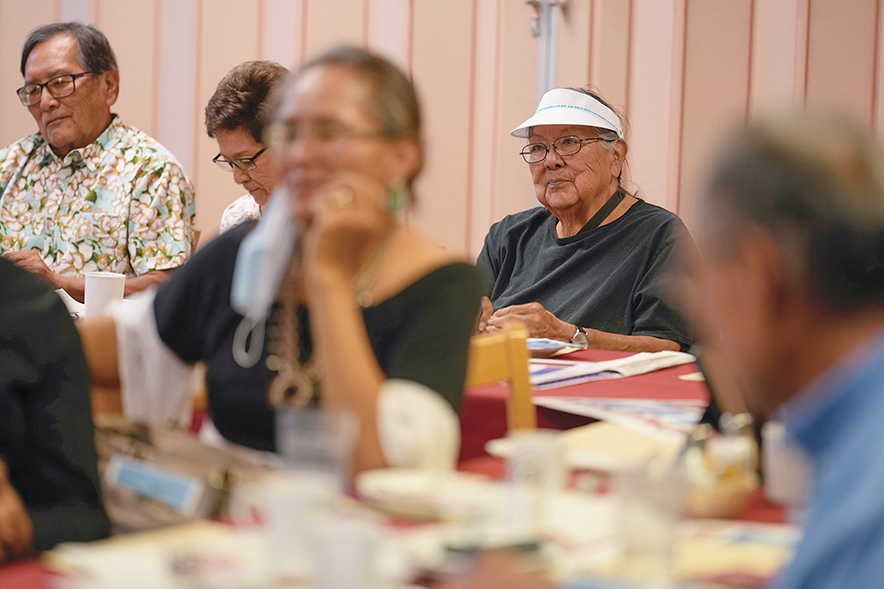
Special to the Times | Donovan Quintero
Rosalind Zah listens to Democratic candidates running for office on Oct. 7. Zah, the wife of the late Navajo Chairman Peterson Zah, attended the Apache County Voter Town Hall in Window Rock.
“He failed to debate me two times. He didn’t show up for the first one. He declined on the second one,” said Nez. “These debates, these forums, are an opportunity to share your background, your experience, and the vision for the voters and the people, and yet he doesn’t do it. Why? Because he doesn’t have anything to report. He has been in the midst of all the division and the controversy up in Washington, D.C.”
The former Navajo Nation president was on hand to meet with Navajo constituents, along with three other Democratic candidates running for the Arizona Corporation Commission, sponsored by the Arizona Democratic Party. With less than a month left before the general elections, Nez visited the Navajo Nation to remind Navajo voters of the impedance of why they needed to vote blue.
Nez, along with Arizona Corporation Commission candidates Ylenia Aguilar, Jonathon Hill, and Joshua Polacheck, was invited by the Arizona Democratic Party that host a town hall meet-and-greet with Navajo voters in Window Rock.
Ballot measures
The party informed voters of several statewide ballot initiatives they would be seeing on the ballots on Nov. 5. The Arizona Democratic Party’s events coordinator, Sierra Yamanaka, explained to the voters they should vote “yes” for only one of the propositions and “no” for the rest.
“I’m going to start with what you should ‘vote’ yes on, which is the Arizona for abortion access initiative. We want to make sure that women’s reproductive freedom is protected in the state of Arizona, and we have the opportunity to do that. So that’s Prop 139. That is the only one that you should vote ‘yes’ on,” Yamanaka explained to Navajo voters in attendance.
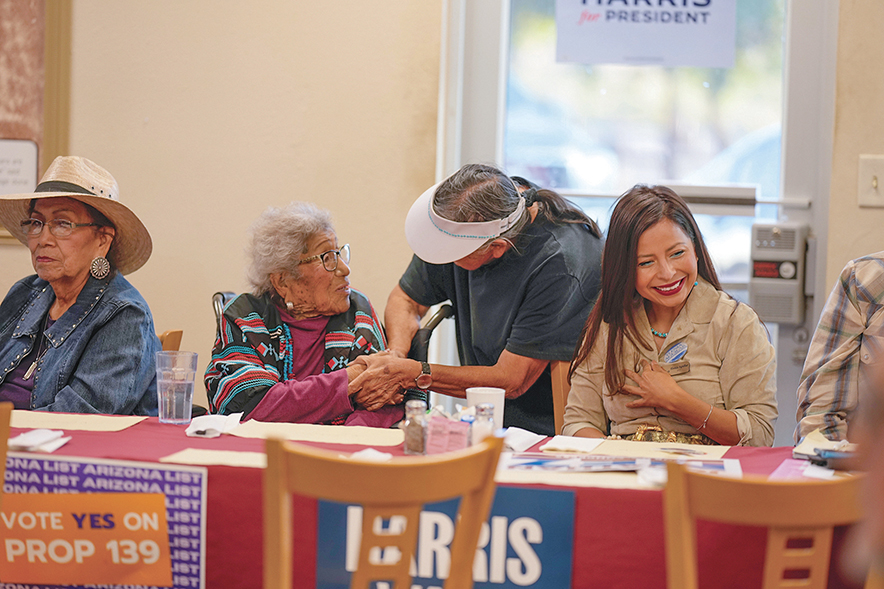
Special to the Times | Donovan Quintero
Rosalind Zah greets Louva Dahozy during the Apache County Voter Town Hall in Window Rock on Oct. 7.
Proposition 139, the Right to Abortion Initiative, establishes a constitutional right to a safe and legal abortion under rules similar to those previously in place under Roe v. Wade.
Prop 139 aims to amend the Arizona Constitution by establishing the fundamental right to abortion, which the state cannot interfere with before the point of fetal viability. Fetal viability is defined in the measure as the stage of pregnancy when there is a significant chance of survival of the fetus outside the uterus without extraordinary medical intervention. Additionally, the proposition allows for abortions after fetal viability if necessary to protect the life, physical health, or mental well-being of the pregnant individual, as determined by a healthcare professional.
If passed, Proposition 139 would enshrine these rights in the state constitution, ensuring that any government interference before fetal viability would require a compelling state interest. Voters will have the opportunity to make their voices heard on this critical issue, with a “yes” vote indicating support for the amendment and a “no” vote signaling opposition to the constitutional right to abortion.
The measure also includes provisions that prohibit laws penalizing individuals who aid or assist those exercising their right to an abortion, reinforcing protections for both patients and supporters.
Yamanaka said putting the Right to Abortion Initiative on the ballot was to circumvent Arizona Governor Katie Hobbs’ veto pen because Republicans knew she would.
“They thought that if they could put it on the back of the second page of your ballot, they can slip through some of the things that they want to accomplish kind of while no one’s looking,” Yamanaka told Navajo voters.
Yamanaka encouraged voters to vote “no” on 12 other initiatives that made it to the Nov. 5 ballot: propositions 133, 134, 135, 136, 137, 138, 149, 311, 312, 313, 314, and 315.
Arizona 2024 elections
Proposition 133, the Require Partisan Primaries and Prohibit Primaries Where Candidates Compete Regardless of Party Affiliation Amendment, would require partisan primaries for partisan offices, meaning that members of political parties nominate their candidates at primaries for general elections.
Proposition 134, the Signature Distribution Requirement for Initiatives Amendment, would require that a percentage of signatures for initiative petitions come from each legislative district in Arizona.
Proposition 135, the Emergency Declarations Amendment, would provide for the legislature to terminate a state of emergency or alter the emergency powers of the governor during the state of emergency.
Proposition 136, the Legal Challenges to Constitutionality of Initiatives Amendment, would amend the state constitution to introduce new provisions regarding challenges to the constitutionality of proposed constitutional amendments or initiative measures. This means that the amendment would allow any person to file a legal challenge in the superior court regarding the constitutionality of a proposed constitutional amendment or initiative measure at least 100 days before the date of the election where the measure or amendment is scheduled to be voted on.
Proposition 137, the End Term Limits and Retention Elections for Supreme Court Justices and Superior Court Judges Amendment, would end term limits for state supreme court justices and superior court judges, replacing them with “terms of good behavior” unless decided otherwise by judicial review commission.
Proposition 138, the Wages for Tipped Workers Amendment, would allow for tipped workers to be paid 25% less per hour than the minimum wage if any tips received by the employee were not less than the minimum wage plus $2 for all hours worked.
Proposition 140, the Single Primary or All Candidates and Possible RCV General Election Initiative, would make changes to the state’s electoral system, including primaries and general elections.
Proposition 311, the Criminal Conviction Fee for First Responder Death Financial Benefit Measure, would establish a $20 penalty fee for each criminal conviction in Arizona. The fees would go to a newly created state supplemental benefit fund. Under this measure, a surviving spouse or children of a first responder would receive a benefit of $250,000 from the fund if the first responder is killed in the line of duty.
Proposition 312, the Property Tax Refund for Non-Enforcement of Public Nuisance Laws Measure, would allow property owners to apply for a property tax refund in certain circumstances, including in instances if the city or locality in which the property is located does not enforce laws regarding illegal camping, loitering, obstructing public thoroughfares, panhandling, public urination or defecation, public consumption of alcoholic beverages, and possession or use of illegal substances.
Proposition 313, the Life Imprisonment for Sex Trafficking of a Child Measure, would establish a life sentence for anyone convicted of a Class 2 felony for child sex trafficking.
Proposition 314, the Immigration and Border Law Enforcement Measure, would make it a state crime for noncitizens to enter the state directly from a foreign nation other than official ports of entry, and allow for state and local police to arrest noncitizens who cross the border unlawfully.
Proposition 315, the Legislative Ratification of State Agency Rules that Increase Regulatory Costs Measure, would require that any proposed rule projected to increase regulatory costs in the state by over $100,000 within five years of implementation be submitted to the Office of Economic Opportunity for review.
The Arizona Corporate Commission
The Arizona Corporation Commission, which oversees executive, legislative, and judicial proceedings on behalf of Arizonans when it comes to utilities, natural gas resources, and the regulation of securities, pipeline, and railroad safety, is not included in Proposition 315.
The ACC, according to its website, is dedicated to shaping a sustainable future for the state by guaranteeing safe, reliable, and affordable utility services, as well as extending beyond utility oversight to include fostering economic growth by supporting local entrepreneurs in their efforts to start and grow businesses.
Aguilar, Hill, and Polacheck are all running for three of the five ACC seats, which are currently held by four Republicans and one Democrat.
Aguilar spoke first to Navajo voters and said she is currently serving on the Central Arizona Water Conservation District board on which she works to protect the Colorado River water.
“I was recruited to run for the Arizona Corporation Commission, which is one of the most important, vital boards in our state because it regulates our utilities. We all know in this room how important water is, but electricity is also as important,” said Aguilar. “This body right now, we currently have four Republicans and one Democrat, and they are the ones who approve the rates for the cases in our state, and that’s what causes our utility bills to go up.”
Hill explained further that that ACC does not have regulatory authority over the Navajo Nation, but it does for Navajos living off the reservation.
“So, as Ylenia mentioned, they’re in charge of regulating all the utility companies, except for here on the Navajo Nation. But for those of you who don’t live in the Nation, they regulate electricity, water, natural gas, and telecommunications. So, if anyone still has a landline, the corporation commission regulates that,” Hill explained, who has a doctorate in geology, in addition to working on several NASA science projects, such as the two Mars rovers: Spirit and Opportunity, as well as working on two asteroid missions, and a mission that’s going to Jupiter.
Polacheck was the last ACC candidate to speak and make his pitch on why Navajos should vote for him.
“Republicans on the corporation commission do not care about what is happening in rural Arizona, and we need to change that. And I will promise you that if you help us elect three Democrats to the corporation commission, we will ensure that within a decade, every person who wants to get on the grid, whether it’s the big grid or a micro, local grid, will have access to the grid by 2035 and that is a promise that I’m making here tonight,” said Polacheck.
Former Council Delegate Lorenzo Curley, of the 20th, 21st, and 22nd Navajo Nation Council, who’s an attorney for the Department of Justice, said he appreciates the Arizona Corporation Commission candidates coming out to the Navajo Nation to explain the role of the commission.
“I think everybody in the Navajo Nation knows the difference between Republicans and Democrats. But when it comes to corporate commissioners, I don’t think a lot of those understand what they do. And so, yeah, I think a typical voter, would just go in there and just kind of skip that section and without even reading any of that stuff,” said Curley.
The former Navajo Nation lawmaker added he appreciates the party taking the time to explain, as well as provide a pamphlet, what each proposition is about. He said attendees could now take that information back to their chapters where they could explain each initiative.
After the town hall meeting, Nez said the topic he kept hearing from constituents in the district he’s running for was water.
“The number one topic that has come up is water security, and my opponent is campaigning on immigration. Don’t get me wrong. I know we have a problem with immigration that needs to be fixed. We almost had it with a bipartisan bill, but Donald Trump tanked it. But in the rural communities, it’s water infrastructure, water, electricity, broadband, telecom, high-speed internet in the most rural parts of Arizona, fixing the roads. That and bringing the cost of goods and services down is another one that keeps coming up. Every day, people, citizens of this country, are having to pay high prices for goods and services and gas. I know that Congress has the ability to keep bringing some of those costs down,” he said.
Nez expects a historic turnout, especially among young and new voters. He stressed the importance of addressing Indigenous issues, such as water rights and uranium waste disposal, and contrasted his proactive approach with his opponent’s lack of action.
Early voting started yesterday, Oct. 9, and the General Election is on Nov. 5, beginning at 7 a.m., across the Navajo Nation.


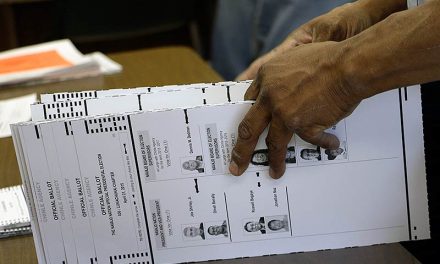





 Highway 264,
Highway 264, I-40, WB @ Winslow
I-40, WB @ Winslow